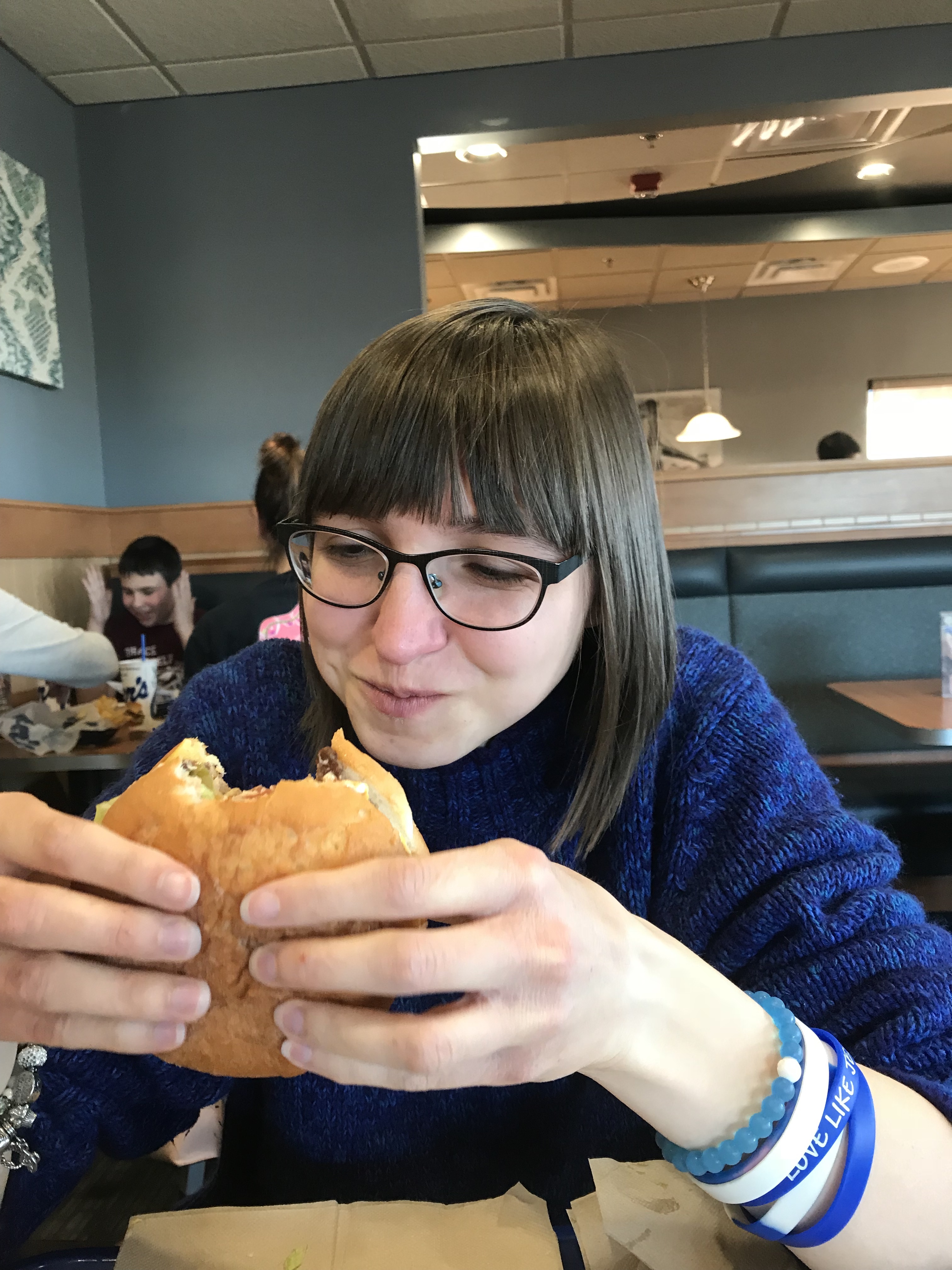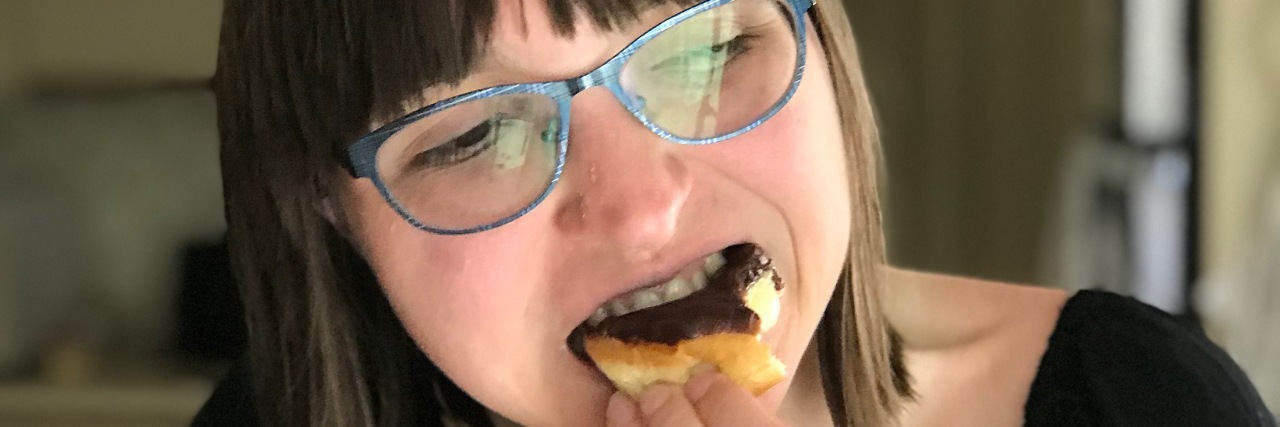The Problem With Asking People, 'Should You Be Eating That?'
Last week, my mother and I went to a local church event for women — a time of food, fellowship, and testimonies. I had spoken there once before, telling the story of my journey with postural orthostatic tachycardia syndrome (POTS) and median arcuate ligament syndrome (MALS), but it was our first time returning since then. I’ll admit that I wasn’t exactly looking forward to the evening (social situations are not my cup of tea), but I was feeling well enough to go –I had actually remembered when it was happening and had prepared accordingly, and I didn’t have to worry about what I would eat there.
This last point may seem odd, but my relationship with food for the past three years has been odd, to say the least, and it became especially strained during 2016. This was due mostly to MALS, a congenital anatomical anomaly that occurs when the median arcuate ligament compresses the celiac artery and a bundle of sympathetic nerves called the celiac ganglion. This compression produces symptoms such as extreme pain after eating, nausea, vomiting, and unexplained weight loss, just to name a few.
In January of 2016, I was at the Mayo Clinic, looking for any and all treatment plans that might help reduce some of my POTS symptoms, including stomach pain. By September of that year, I had lost several pounds and we were back at Mayo again, this time for the debilitating stomach pain that came every time I ate a bite of food or took even a small drink of water. We didn’t find the answers we were looking for at Mayo, but through a very long story, I was diagnosed with MALS and surgically treated in November of 2016. Since then, my pain is significantly reduced. I can eat a full meal without curling up into a ball of agony for hours afterwards, and drinking water no longer makes me want to die. All in all, a great improvement.
Another great and recent development is that I can now eat gluten again. For some unknown reason, in August of 2015, my body suddenly stopped tolerating gluten — and in the most bizarre way possible. My heart would pound and race, my head would feel tingly or buzzy, I would experience a sudden (though, thankfully, short) hot flash, and I had to consciously remind myself to inhale and exhale. Not only that, but I would also turn into something closely resembling a toddler. Think of those moments when you’re just a little too tired and you start acting goofy — or maybe you’re a little drunk, and your speech is slurred but you just can’t stop talking and giggling at all of the ridiculous things coming out of your mouth. That’s basically what happened to me every time I ate gluten.
It wasn’t much fun.
But, just last month, I started following a protocol by Dr. Patrick Nemechek, which is used to treat patients on the autism spectrum and those with autonomic disorders like POTS. Going into it, I didn’t expect much — but by way of treatment plans, this one is super easy and comes with fewer side effects than anything I’ve ever tried, so I did it anyway. A few weeks after starting the protocol, my family and I took a trip to visit my grandparents in Florida. While there, we went to one of their favorite restaurants, and I said, “Screw you, body!” and ate gluten. I had some mild palpitations and reverted to my toddler state — but, surprisingly, that was all. The weirdest thing that happened to me was not a sudden hot flash or the inability to breathe. The weirdest thing was that I ended up playing an entire round of Skip-Bo while pretending I was a T-rex. And while that may sound very weird to you, it was actually very wonderful for me.

Now, after having followed the protocol for a month, I can eat gluten again without any of the weird symptoms it gave me before. A whole new world of foods has been opened up to me, and I’m actually excited about eating again! It’s amazing, and my family is reveling in my tiny victory by bringing home donuts and pizza and chocolate-covered pretzels. I’m not exaggerating when I say it’s a dream come true.
This brings us back to the women’s church event I went to last week with my mother. Much to my intense disappointment, the dinner provided was a salad and rolls with a pudding-and-cake dessert. I know, I know, I should be grateful that there was free food — but for somebody who didn’t want to eat salad even when she was gluten-free and that was the only options available on the menu, I can tell you that I want to eat a salad even less now. But, given the circumstances, I took a roll and my leafy greens (and a large helping of dessert, courtesy of my mother scooping a ton of it into my dish) and went back to our table. Another woman sat down with us and chatted a bit, but one thing in particular that she said stood out to me:
“So, Vanessa, do you have to be as careful with what you eat nowadays?” she asked.
“Nope!” I said, happily shoving a buttered roll into my face.
“Should you be careful with what you eat?” she asked. And maybe she was joking, but it was hard to tell.
“Nope,” I said, and maybe my tone was a bit harder than I wanted, but I don’t think she noticed around my mouthful of bread.
I’ve been thinking about this question a lot since then. The answer is, of course, no — after three years of battling with food, and one year in which eating became nearly impossible, the answer is no. I should not have to “be careful” about what I eat. I should not have to count calories or cut carbs or only eat salads — I should be allowed to eat what tastes good.
My mantra sounds odd to a lot of people, and I know that it doesn’t fit with what society says is “healthy.” We live in a culture that is obsessed with food, particularly when it comes to making that food “healthier.” Our society runs rampant with diets. Cut out this, avoid that, eat more kale! But most of them are not actually designed to make you healthier.
They are designed to make you lose weight.
Which, I can tell you from experience, is sometimes very, very unhealthy.
When my symptoms were at their worst, I dropped several sizes in a matter of months without even realizing it had happened. I had been wearing sundresses, the coolest thing I own, to combat the summer heat — and it wasn’t until the fall rolled around and I pulled on my blue jeans that I realized they were way too big. I had been the same size for years. And now, suddenly, I was in desperate need of new pants — and not because I had set a goal for myself and was “careful” about what I ate. I had shrunk because I couldn’t eat. I had shrunk because, even though I ate the most calorically dense and unhealthy foods I could find, I still couldn’t consume enough calories in a day. I had shrunk because I was very, very sick.
But no one outside my immediate family noticed. My grandmother was the only one who, when she saw me, was alarmed at how small I had become. To everyone else, I looked good. I was skinny. I was what they envied. It didn’t matter how I got there — the tears, the pain, the fear — it just mattered that I fit into a smaller size.
The mentality that all weight loss is good weight loss permeates our culture. Every day, at every turn, the media presents a standard of beauty that is unattainably thin, and so we emulate it. We count calories. We cut carbs. We eat more kale.
But there is a difference between losing weight and being healthy. “Losing weight” and “being healthy” are not mutually exclusive, but they’re also not synonymous. It is possible to lose weight in a healthy way…but it’s also possible to lose weight in a very unhealthy way. The problem is that our culture rarely makes a distinction between healthy and unhealthy weight loss — we just want weight loss. Nobody seems to care how they get it.
A friend of mine, who, through another long story, was also diagnosed with MALS, lost a large amount of weight before she was diagnosed and treated. She experienced pain and nausea so bad that she couldn’t eat, and eventually she couldn’t even tolerate tube feeds. She was actively starving to death, labelled with an eating disorder by doctors who could not properly diagnose her, and told she “looked good” by people who did not bother to look closer than the size of her waist.
She did not look good. She looked malnourished and tired and pained.
But she was thin.
So she looked good.
There’s something wrong with a society that tells a starving woman she looks good. There’s something wrong with a society that asks a woman who can finally eat, “Should you be be eating that?” There’s something wrong with a society that makes me feel guilty for eating a donut after three years, that makes me look in a mirror and wonder if I’m getting “fat” because I can finally eat donuts again, that thinks “getting fat” is the worst thing that could happen to a person. There is something wrong with a society wherein how much you weigh is the be-all-end-all of the health discussion.
My brother, a healthy young man, is told by his doctor that he needs to lose weight. There’s no reason why — my brother’s numbers are simply higher than what they are “supposed to be,” and so he’s told he needs to lose weight. It doesn’t matter that he eats his leafy greens (and actually enjoys them!) and exercises almost religiously. It doesn’t matter that his body is strong and healthy. He’s still “too big.” He still needs to lose weight.
“Being healthy” does not look the same for every person, and “losing weight” is not always healthy. Losing weight comes in many shapes and sizes — exercise, diet changes, blood-sucking leeches — but losing weight due to a chronic illness comes in only one size. It’s a size that encompasses pain, nausea, malnourishment, fatigue — and that’s not even touching on the mental side of things, like the terror of watching yourself waste away or the simple sadness of missing food. The chronic illness weight loss plan isn’t advertised on the covers of women’s magazines, but with all the times I’ve been told I look good, I almost think people wish it was. Our society’s fixation on weight — and losing it — is detrimental for chronically ill and healthy alike.
Not all weight loss is good weight loss.
Not all weight loss is good weight loss.
So let’s stop treating it like it is.

